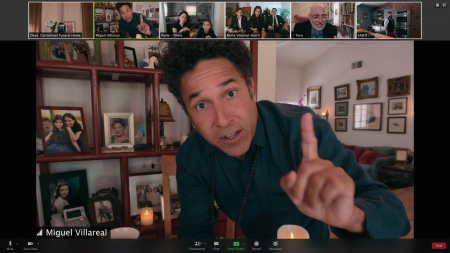
News
Pro-Palestine Encampment Represents First Major Test for Harvard President Alan Garber

News
Israeli PM Benjamin Netanyahu Condemns Antisemitism at U.S. Colleges Amid Encampment at Harvard

News
‘A Joke’: Nikole Hannah-Jones Says Harvard Should Spend More on Legacy of Slavery Initiative

News
Massachusetts ACLU Demands Harvard Reinstate PSC in Letter

News
LIVE UPDATES: Pro-Palestine Protesters Begin Encampment in Harvard Yard
Netflix’s ‘Social Distance’ Endeavors to Warm Our Lonely Hearts

“Social distancing” has joined the ranks of everyday vocabulary in the pandemic era. Taking its place alongside phrases such as “herd immunity,” “asynchronous instruction,” and “quarantine,” the notion of physical isolation — once incredibly alien — has become as commonplace as a favorite oversized T-shirt.
While the concept of standing six feet away from other people is understandably foreign, humanity is no stranger to isolation. Despite Facebook, Instagram, and other tech giants’ claims that social media brings individuals closer together, one could argue that curated profiles, canned emoji reactions, and counting likes work to exacerbate human superficiality and loneliness — a phenomenon that “Social Distance,” Netflix’s new miniseries focusing on ordinary people braving the pandemic, attempts to explore.
The common struggle of reconciling with solitude is investigated throughout the series, particularly in episode one. Ike (Mike Colter), a good-natured man who has just broken up with his girlfriend, is depicted sitting alone through a Zoom screen. Though the quarantine has rendered the Zoom platform far too familiar for many, it is still largely unexplored in television. By inserting social media interfaces – namely Zoom, FaceTime, and Instagram – directly into the camera frame, “Social Distance” cleverly dips its feet into a novel form of televisual expression that is representative of the new normal.
Ike speaks to a tapestry of human thumbnails, later calling a friend from the help group. “It’s stupid,” he says after confiding about a recent heartbreak. “Especially when so many people have actual problems, you know?”
This guilt is a frequent motif throughout the series, one that colors the quarantine experiences of all the show’s characters in distinct and dynamic ways. Not only is there a guilt, as Ike mentioned, of feeling low in the midst of unprecedented casualties, but there is also a general sense of defeatism, of lethargy coupled with an inclination to do absolutely nothing. In episode four, a couple argues over the optimal way to pass the days in quarantine.
“We’re supposed to be doing nothing. That’s the whole lesson of this,” one man says. “You need to stop optimizing and just be.” In episode five, a man with a COVID-infected spouse FaceTimes his sister on the brink of tears:
“I feel like I’m failing all over the place,” he says.
Although the series’ dialogue sometimes walks the tightrope between authentic and unrealistic, the most memorable bits of conversation are these raw, brief bursts of emotional vulnerability. Similarly, while there are instances when performances are awkward and sometimes even halting, it is during these honest depictions of fear and loneliness that the actors shine through the screen.
As the series progresses, there is a palpable shift from the gentle warmth of human togetherness to the sharp edge of political crisis. In episode seven, introverted Chinese teenager Mia must reconcile with her crush’s perpetuation of racist rhetoric on social media. Though the 20-minute episode leaves the viewer wishing there was increased opportunity to explore Mia’s complex relationship to her Chinese heritage in an evolving American landscape, the abrupt realization of her crush’s racism illustrates an awakening that is as necessary as it is disruptive.
Intergenerational racial tension is further explored in the final episode, in which two Black men, an employed adolescent and his boss, are setting up cameras for a largely white preparatory school’s socially distanced graduation. The two engage in an escalating argument about the Black Lives Matter movement; while the teenager believes protest is the only step towards actual change, the employer argues that economic advancement is the singular answer to Black empowerment.
“That’s the problem with y’all generation,” the man says. “Think y’all discovered racism.”
“Why are we the ones that are expected to regulate our response,” the boy responds, “but no one expects them to stop killing us?” In its refusal to provide solutions to escalating racial and intergenerational conflicts (the argument crescendos until the boy quits his job in a rage), “Social Distance” paints a bleak future for collaborative change-making.
While a wide range of critical societal conundrums are well exhibited in each episode, the 20-minute timestamp restricts the creative breadth and emotional depth of each story. Though “Social Distance” endeavors to redress a status quo that is fraught with death, uncertainty, and political divisiveness, viewers are frequently left with a superficial, already anticipated takeaway in place of an earth-shattering revelation.
Despite its shortcomings, however, “Social Distance” makes a valiant effort to warm our lonely hearts. In a new normal where there are more technological devices in a room than there are people, in a world populated by more social media posts than candid conversations, “Social Distance” strives to elucidate the commonality in our mutual solitude.
We are all alone, and in that aloneness, we are together. Each 20-some minute episode of the televisual anthology illuminates heartwarming instances of human connection in a tragically disconnected status quo. Whether it be a Type A professor learning to care for her mother’s caretaker’s daughter or an eclectic family uniting over Zoom for a virtual funeral, the contents of each episode reflect an intense reverence for the enduring connective tissue of the human experience.
Want to keep up with breaking news? Subscribe to our email newsletter.
